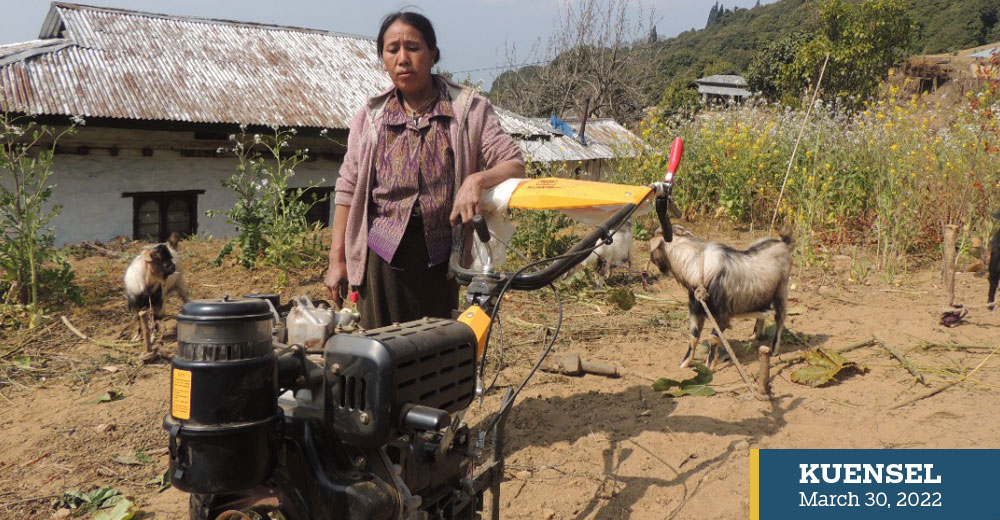Choki Wangmo | Tsirang
Nar Maya Thapa, 52, has been raising five children alone, doing household chores, farm works and taking care of her husband, who became disabled after falling off a tree.
She said working on the farm became much easier after she availed a loan of Nu 87,000 from RENEW’s (Respect, Education, Nurture and Empower Women) microfinance scheme and bought a power tiller.
She was one of the first beneficiaries in the dzongkhag since the scheme was first introduced in 2015.
Often seen behind the power tiller on her five-acre field in Nyemedsa, located about four kilometres away from Damphu Town, Nar Maya said she had to carry out only household chores when her husband was healthy.
He became disabled when he was 45 years old. Today he is 58.
Today, she grows vegetables and also looks after the livestock. The money she earns from selling vegetables and dairy products are used to pay the loan, meet household expenditures, and pay for her children’s education, which she uses from her savings.
Of about Nu 3,000 she earns every week selling vegetables, she saves Nu 700 to Nu 1200 for the loan repayment.
Nar Maya said she learnt the saving culture after joining the scheme. “When my husband was unwell, we had no savings. I wished I had saved a little for emergencies, but we had no source of income.”
Her husband, Kul Bdr Samal, who earned income from working for others and selling vegetables in the past, said he was helpless and a burden to his wife. “But I am hopeful that our life would be easier as children started earning their living. My wife is a strong woman.”
Like Nar Maya, there are about 3,000 beneficiaries of RENEW microfinance in the dzongkhag.
Started in 2012, the project targets to improve quality of life and the status of vulnerable women and their families, mainly in rural areas and empower them through financial independence.
On March 21, 150 clients in Sergithang gathered to meet RENEW officials.
The officials visit the gewogs on a set date providing financial services.
Tsirang’s branch manager, Kuenga Tshering, said that most of the clients were single mothers and women. He said they provide door-to-door services for those who do not have access to banks.
Nalem, 70, from Sergithang Toed had to walk more than an hour to meet the officials.
She wants to open a shop in her village and wants to avail a loan of Nu 70,000.
Most of them withdrew money on that day. There were small-scale savers, saving a few hundreds. “They come to withdraw money, buy essential items, and save a few amounts,” Kuenga Tshering said.
While some clients sold snacks, others brought vegetables and fruits for sale among themselves. The clients earn most of their income from vegetable farming.
However, the pandemic, lack of marketing, and lack of proper transportation of farm produce affect their venture.
“We try to save for emergencies but expenditure is always higher than income,” a villager, Tenzin Lham, said.


